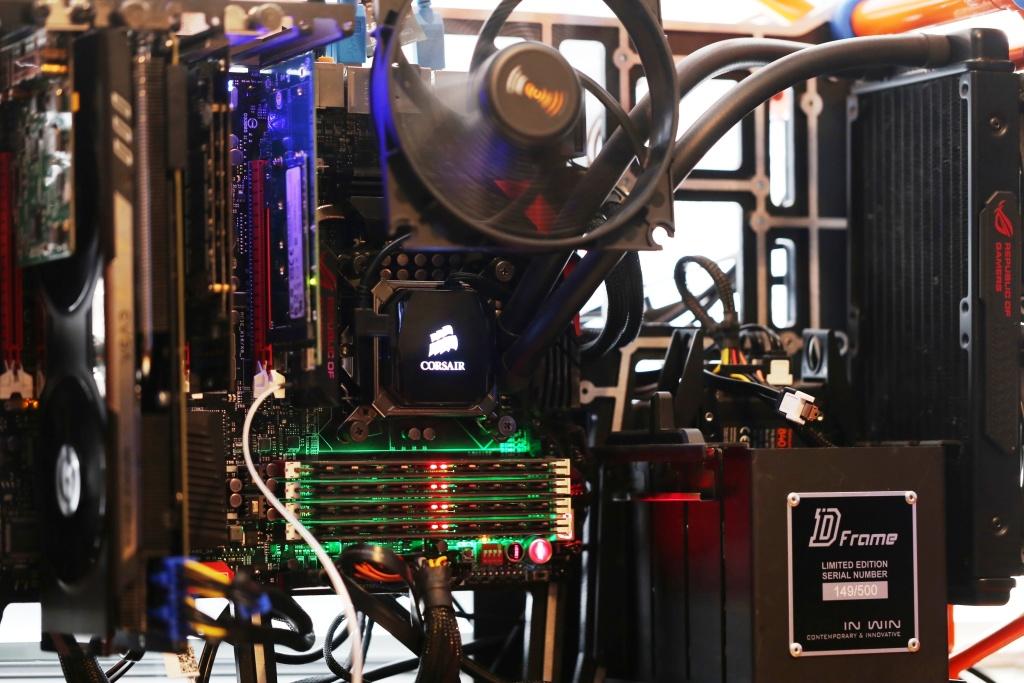TSSDR TEST BENCH AND PROTOCOL
SSD Testing at TSSDR differs slightly depending on whether we are looking at consumer or enterprise SSDs. For consumer SSDs, our goal is to test in a system that has been optimized with our SSD Optimization Guide, although CPU C States have not been changed at all. Benchmarks for consumer testing are also benchmarks with a fresh drive so, not only can we verify that manufacturer specifications are in line but also, so the consumer can replicate our tests to confirm that they have an SSD that is top-notch. We even provide links to most of the benchmarks used in the report.
Enterprise testing is significantly different as we explore performance in steady state, explore drive latency, and do our best to follow SNIA test protocol. For the Silicon Motion SM2246EN controller, it is intended to be marketed within a consumer/client SSD so we are going to follow our typical consumer SSD testing protocol.
SYSTEM COMPONENTS
This new PCIe Test Bench build was the result of some great relationships and purchase; our appreciation goes to be quiet, Corsair, Crucial, Intel, EVGA and InWin for their support in our project. Our choice of components is very narrow, in that, we choose only what we believe to be among the best available and links are provided to each that will assist in hardware pricing and availability, should the reader be interested in purchase.
| PC CHASSIS: | InWin D-Frame Open Air Chassis |
| MOTHERBOARD: | ASUS Maximus VI Z87 MotherBoard |
| CPU: |
Intel Core i7-4770K CPU |
| CPU COOLER: | Corsair H100i CPU Cooler |
| POWER SUPPLY: | be quiet Dark Power Pro 10 1000W PSU |
| SYSTEM COOLING: | be quiet Silent Wings 2 PC Fans |
| GRAPHICS CARD: |
EVGA GTX 770 Superclocked with ACX Cooler |
| MEMORY: | Crucial Ballistix Tactical Tracer 1600Mhz Memory |
| KEYBOARD: | Corsair Vengeance K95 Mechanical Gaming Keyboard |
| MOUSE: | Corsair Vengeance M95 MMO/RTS Laser Mouse |
| ROUTER: | NetGear R6300 AC1750 Dual Band Gigabit WiFi Router |
| HBA | HighPoint RocketU 1144C 4 x USB 3.0 20Gb/s HBA |
.
BENCHMARK SOFTWARE
The software we will be using for today’s analysis is typical of many of our reviews and consists of ATTO Disk Benchmark, Crystal Disk Info, Crystal DiskMark, AS SSD, Anvil Storage Utilities,and PCMark Vantage. In consumer reports, we prefer to test with easily accessible software that the consumer can obtain, and in many cases, we even provide links. Our selection of software allows each to build on the last and, also, to provide validation to results already obtained.
ATTO Disk Benchmark is perhaps one of the oldest benchmarks going and is definitely the main staple for manufacturer performance specifications. ATTO uses RAW or compressible data and, for our benchmarks, we use a set length of 256mb and test both the read and write performance of various transfer sizes ranging from 0.5 to 8192kb. Manufacturers prefer this method of testing as it deals with raw (compressible) data rather than random (includes incompressible data) which, although more realistic, results in lower performance results.
Benchmarks highs of 561MB/s read and 414MB/s write are pretty impressive, considering we expect this controller to be a mid-range controller and it is still a prototype. Also impressive was the jump in speeds at the 8K file test.
CRYSTAL DISK BENCHMARK VER. 3.0 X64
Crystal Disk Benchmark is used to measure read and write performance through sampling of highly compressible data (oFill/1Fill), or random data which is, for the most part, incompressible. Performance is virtually identical, regardless of data sample so we have included only that using random data samples:
As we can see, performance results are very similar, even in testing with highly incompressible data. Our first look at the low 4k random write performance of 85MB/s was decent, as well.
Up until recently, AS SSD was the only benchmark created specifically for SSD testing and it uses incompressible data. AS SSD, for the most part, gives us the ‘worst case scenario’ in SSD transfer speeds because of its use of incompressible data and many enthusiasts like to AS SSD for their needs. Transfer speeds are displayed on the left with IOPS results on the right.

 As expected, performance throughput performance dropped just a bit in AS SSD, however, the Total Score of 938 was great, as were the IOPS results of 76K read and 63K write.
As expected, performance throughput performance dropped just a bit in AS SSD, however, the Total Score of 938 was great, as were the IOPS results of 76K read and 63K write.
 The SSD Review The Worlds Dedicated SSD Education and Review Resource |
The SSD Review The Worlds Dedicated SSD Education and Review Resource | 

thanks, helpful review! The link to Amazon is not working though. Not really important for me, but was interested in the offers at Amazon. I’ll find out by searching overthere. Thanks.
Reading this after all these years… great little review, thank you!
Would have been even better if you had compared it to the other controllers on the market.
Otherwise, doesn’t give much context, and I had to skip to read your conclusion.